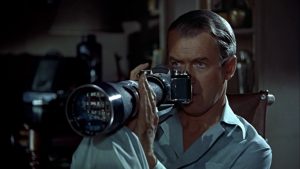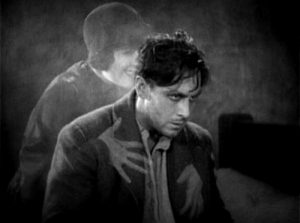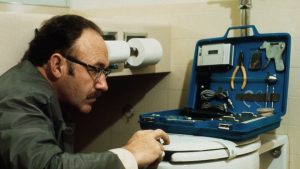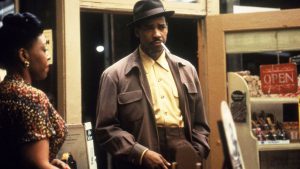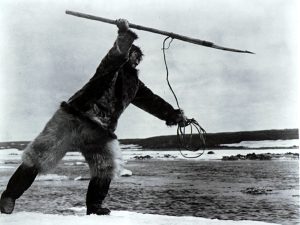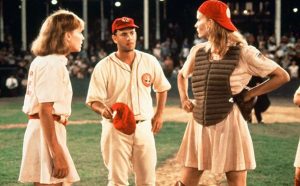REAR WINDOW
Directed by Alfred Hitchcock (U.S. 1954) 114 min. DCP. With James Stewart, Grace Kelly, Wendell Corey.Hitchcock’s brilliant meditation on cinema and voyeurism binds the viewer to the perspective of photojournalist Stewart, bound to a wheelchair with a broken leg and obsessively spying on his West Village neighbors. One of the Master of Suspense’s greatest successes.
TOP OF PAGE
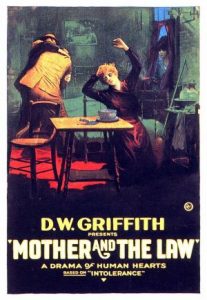
Monday, August 29 at 7pm
THE MOTHER AND THE LAW
D. W. Griffith (U.S. 1919) 76 min. With Mae Marsh, Robert Harron, Miriam Cooper, Vera Lewis.
Culled from and an expansion upon Griffith’s Intolerance – now considered the director’s masterwork but then a failure at the box office – The Mother and the Law was originally the 1916 multi-part film’s “Modern Story,” in which two young people are made homeless by a strike and struggle valiantly to survive their desolate situation and keep their family intact. Music score by The Mont Alto Motion Picture Orchestra.
TOP OF PAGE
Monday, September 5 at 7pm
STRIKE
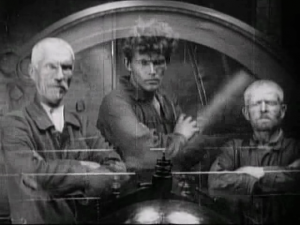
Sergei M. Eisenstein (USSR 1925) 89 min. With Grigori Aleksandrov, Maxim Strauch, Yudif Glizer.
Cinema-changing Sergei Eisenstein’s first feature is a tour-de-force of dynamic editing and experimental camerawork that dramatizes the saga of a bitterly-fought factory strike in 1903. Often compared to Citizen Kane in terms of audacious directorial debuts, Strike embodies the revolutionary spirit of the Soviet 20s, cresting the waves of artistic and political idealism. This edition of the film is from a 35mm restoration by the Cinémathèque de Toulouse, with a newly-recorded score by the Mont Alto Motion Picture Orchestra, adapted largely from the works of traditional Russian composers.
Playing with
Easy Street (Charles Chaplin, 1917, 26 min. DCP): In this iconic Mutual comedy, the police are failing to maintain law and order and so Chaplin’s celebrated Little Tramp character steps forward to rid the slum of bullies, help the poor and save women from madmen.
SUNRISE: A SONG OF TWO HUMANS
F.W. Murnau (U.S. 1927) 94 min. 35MM. With George O’Brien, Janet Gaynor, Margaret Livingston.
As much a revelation now as it was in 1927, Murnau’s masterpiece is set in a weatherworn town across the lake from the big city. The situation is familiar: a happy couple’s marriage is disturbed by an urban seductress. The marvel is Murnau’s poetic depiction of the characters’ every emotion: “invisible” tracking shots, thrilling special effects and sensual lighting are among the stylistic innovations that revolutionized the look of American cinema to come.
Playing with
How Men Propose (Lois Weber, 1913, 6 min. 35MM): A drawing room comedy of multiple proposals, from early Hollywood’s leading female director-screenwriter. Preserved by the Library of Congress.
TOP OF PAGE
Monday, September 19 at 7pm 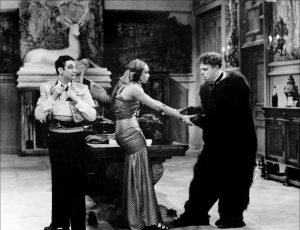
THE RULES OF THE GAME
Jean Renoir (France 1939) 113 min. 35MM. With Nora Gregor, Marcel Dalio, Jean Renoir. French with English subtitles.
Considered one of the greatest films ever made, The Rules of the Game is a scathing critique of corrupt French society cloaked in a comedy of manners, in which a weekend at a country château lays bare some ugly truths about a group of haut bourgeois acquaintances. The film has a tumultuous history: it was subjected to cuts after the violent response of the premiere audience in 1939, and the original negative was destroyed during WWII. It wasn’t reconstructed until 1959; that version, which has stunned viewers for decades, is presented here.
TOP OF PAGE
Monday, September 26 at 7pm
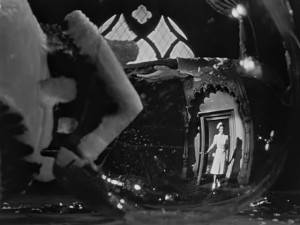
CITIZEN KANE
Directed by Orson Welles (U.S. 1941) 119 min. DCP. With Orson Welles, Joseph Cotton, Dorothy Comingmore.
Named by many as the greatest film of all time, Citizen Kane is a modernist landmark of cinematic style and storytelling. Welles and cinematographer Gregg Toland’s chiaroscuro lighting, deep-focus cinematography and labyrinthine flashback structure imagine the monstrous hollowness of the American dream.
TOP OF PAGE
Monday, October 3 at 7pm
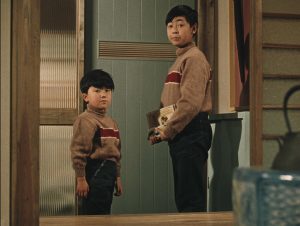
GOOD MORNING aka OHAYO
Yasujiro Ozu (Japan 1959) 93 min. With Koji Shidara, Masahiko Shimazu, Chishu Ryu, Kuniko Miyake. Japanese with English titles.
Ozu’s hilarious Technicolor reworking of his silent I Was Born, But . . . , Good Morning is the story of two young boys in suburban Tokyo who take a vow of silence after their parents refuse to buy them a television set. Shot from the perspective of the petulant brothers, Good Morning is an enchantingly satirical portrait of family life that gives rise to gags about romance, gossip and the consumerism of modern Japan.
TOP OF PAGE
Monday, October 17 at 7pm
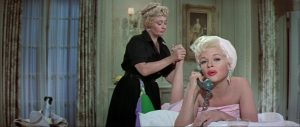
WILL SUCCESS SPOIL ROCK HUNTER?
Frank Tashlin (U.S. 1957) 95 min. DCP. With Tony Randall, Jayne Mansfield, Betsy Drake, Joan Blondell.
Former cartoonist Frank Tashlin once described the subject of his movies as “the nonsense of what we call civilization.” The satirical director’s live-action take on the advertising world features curvaceous Jayne Mansfield, whose “oh-so-kissable lips” are enlisted by ad exec Rockwell Hunter (Randall) to endorse his Stay-Put Lipstick account. She’ll agree if he pretends to be her beau in this pop culture send-up, a dystopian vision of 1950s America fifty years before Mad Men.
TOP OF PAGE
Monday, October 24 at 7pm

CLÉO FROM 5 TO 7
Agnès Varda (France 1961) 89 min. DCP. With Corinne Marchand, Michel Legrand. French with English subtitles.
Agnès Varda, the sole woman director of the French New Wave era, eloquently captures Paris in the sixties with this real-time portrait of a singer set adrift in the city as she awaits test results of a biopsy. A chronicle of the minutes of one woman’s life, Cléo from 5 to 7 is a spirited mix of vivid vérité and melodrama, featuring a score by Michel Legrand (The Umbrellas of Cherbourg) and cameos by Jean-Luc Godard and Anna Karina.
TOP OF PAGE
THE CONVERSATION
Francis Ford Coppola (U.S. 1974) 113 min. With Gene Hackman, John Cazale, Allen Garfield, Frederick Forrest, Cindy Williams.
Made between the first two Godfather films, The Conversation is a sinister portrait of the paranoia of living in the modern world. Gene Hackman is a surveillance expert drawn into a murky whirlpool of mistrust and violence when he’s hired to spy on two lovers. Increasingly obsessed with the audio quality of a critical recording, Hackman goes over a moment in time again and again, showcasing the thriller’s lasting status as a masterpiece of Walter Murchian sound design.
DEVIL IN A BLUE DRESS
Carl Franklin (U.S. 1995) 102 min. 35MM. With Denzel Washington, Tom Sizemore, Jennifer Beals, Don Cheadle.
Denzel Washington stars in this neo-noir as Ezekiel “Easy” Rawlins, a WWII vet turned private eye hired to investigate the disappearance of femme fatale Daphne Monet (Beals), the girlfriend of the favorite candidate in the L.A. mayoral race. Murders follow one step behind Easy on his trail to the truth, as genre conventions mix with mid-century realities of racial politics and passing, in a mystery where nothing is as it seems.
NANOOK OF THE NORTH – Live Musical Accompaniment by Molly Brown!
Robert J. Flaherty (U.S. 1922) 74 min. 35MM.
When no American company would finance Robert Flaherty’s portrait of an Inuit hunter and his family surviving in the Arctic, French furrier Revillon Frères said yes, thereby facilitating the birth of a foundational work of the documentary genre. Neither pure document nor pure fiction, Nanook of the North uses a loose narrative and strong central character to depict the seemingly mundane tasks required to stay alive in a frigid terrain. The beauty and intimacy of Flaherty’s poetic storytelling and careful compositions express an intimacy with and empathy for his subjects — and a sensitivity to their vulnerability, resilience and environment — that remain unrivaled. Likewise, sequences lacking “authenticity” raise timeless questions about ethics and objectivity that the documentary must contend with. Preservation print courtesy of the Museum of Modern Art.
Playing with
LAND WITHOUT BREAD
Luis Buñuel (France 1937) 27 min.
This documentary from one of cinema’s great subversives is ethnographic and surrealist at once. Its subject is the too-real document of its suffering subjects, a disease-ridden community living in a remote region of Spain. Its style is mocking of both the documentary form and us, the viewer: exacerbating the wretchedness glimpsed on screen is the understanding that we are but voyeurs of a nightmare.
A LEAGUE OF THEIR OWN
Penny Marshall (U.S. 1992) 128 min. 35MM. With Geena Davis, Lori Petty, Tom Hanks, Madonna, Rosie O’Donnell.
Tom Hanks plays the misogynistic manager of a WWII era All-American Girls Professional Baseball League team in Penny Marshall’s feel-good chick-flick. Before filming began, all of the actresses trained eight hours a day, six days a week for over seven months to hone their skills and bond as a team; even Madonna, whose “All the Way” Mae Mordabito contributes a tough persona and zesty line readings to the ensemble, participated in the orientation. The summertime release was such a smashing box office success that CBS aired a (short-lived) TV version of A League of Their Own in 1993.
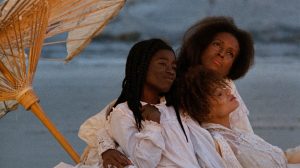
DAUGHTERS OF THE DUST – 25th Anniversary Restoration!
Julie Dash (U.S. 1991) 112 min. With Alva Rogers, Bahni Turpin, Barbara-O.
The first feature film directed by a black woman to receive a national theatrical release, Daughters of the Dust returns to theaters this fall, on the heels of last spring’s chatter around Beyoncé’s “Lemonade” – which many noted reveals the influence of Julie Dash’s neglected film. At the dawn of the 20th century, a multigenerational family in the Gullah community (former West African slaves) in the Sea Islands off of South Carolina suffers a generational split. An older group of sisters return after migrating north to New York with intentions of bringing the rest of their family to the mainland. The newly Americanized sisters view their homeland’s way of living as backwards, while the family elder struggles to pass on the knowledge of their ancestors and keep her family together. Co-presented with Bucknell’s Griot Institute for Africana Studies. Introduced by Carmen Gillespie, Professor of English and the Director of the Griot.
